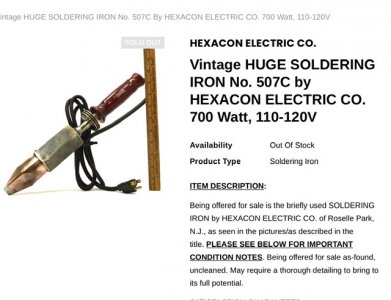- Joined
- Aug 29, 2019
- Messages
- 539
Here I am at the well thirsty again for knowledge. I am trying to solder 12 gage copper wire and 10 gage copper wire and not having any luck. Not my first Rodeo but keep getting Bucked off. Using a clean sample of 12 gage thhn stranded copper wire I cannot get any solder to stick much less flow. I am using 60/40 .8 mm solder along with Plusivo high quality paste. Could it be that I am using a propane flame directly on the wire to heat it thus causing the copper to oxidize. I apply the paste to the wire then heat the wire and then touch the solder to it and it just beads up. I was just about to order another roll of solder to go along with the 2 rolls I already have and decided to ask for help instead. Thanks in advance.


